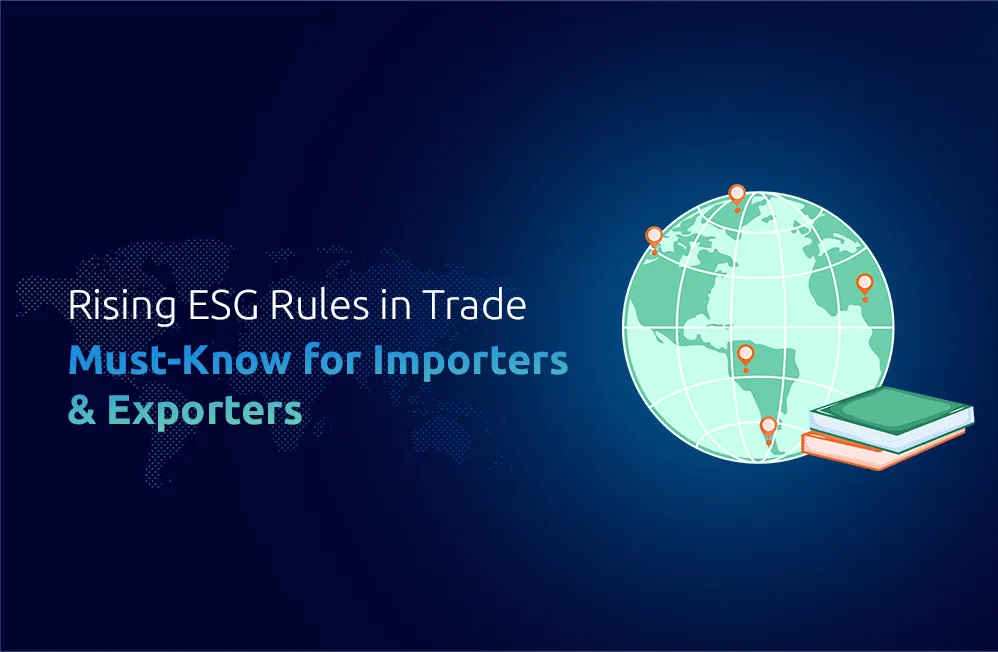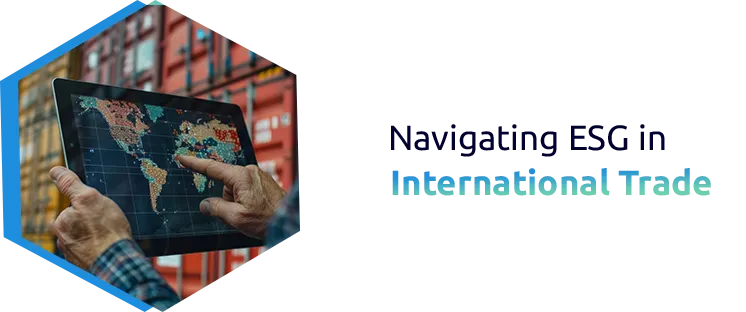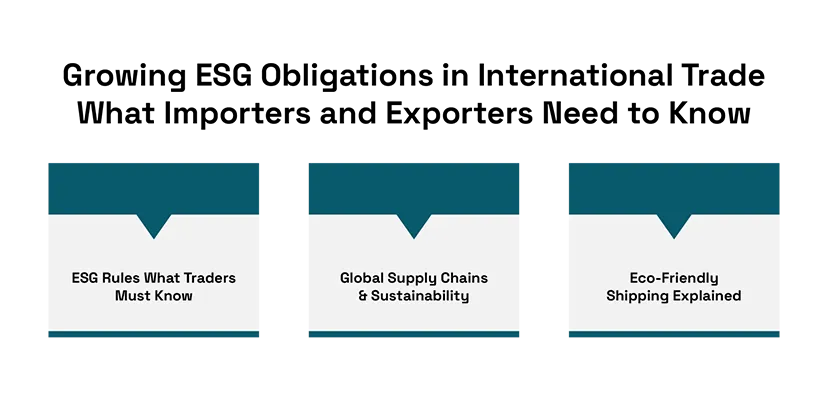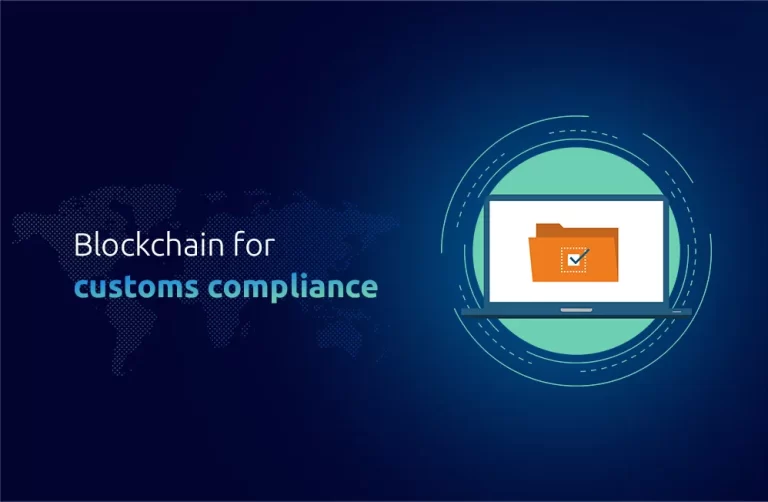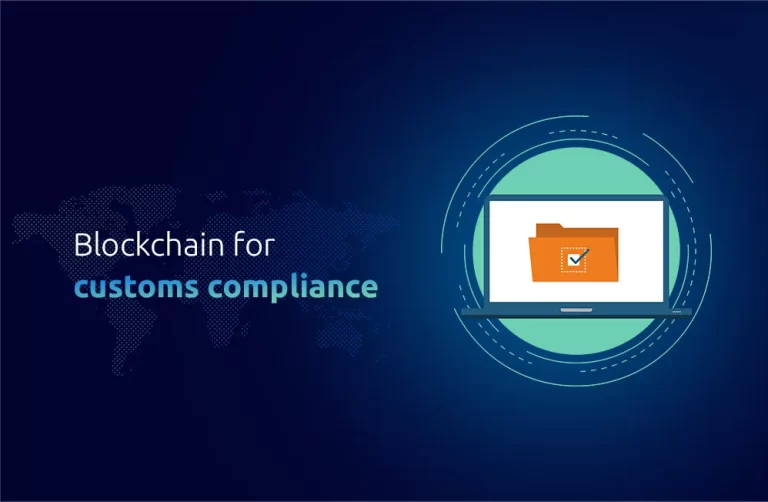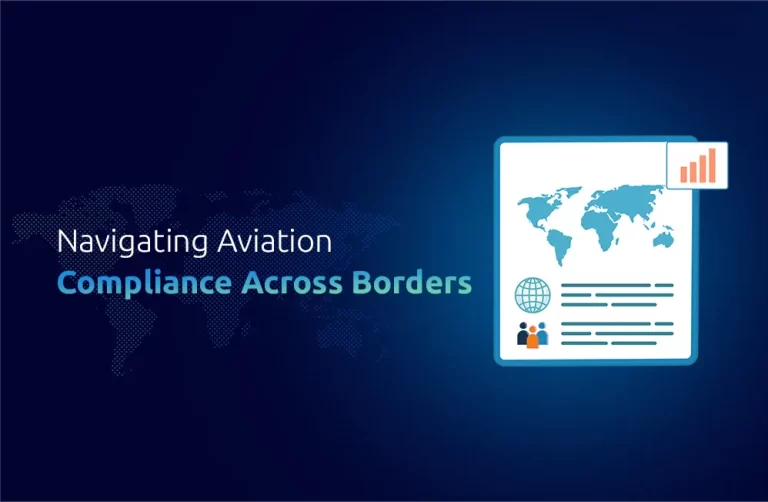Insight
Environmental, social, & governance measures have grown significantly in global trade. Businesses & governments are adopting tougher measures supporting sustainability and ethical business practices. Importers & exporters should work to adjust to these new rules to avoid violations, save the reputation, & keep up with rivals.
The Growing Influence of ESG in Trade
Trade at the global level has traditionally been driven by things such as tariffs, policies, and managing supply chains. On the other hand, ESG regulations are impacting the situation. Now, businesses must consider ESG obligations when carrying out trade activities from the beginning to the end.
Many governments & regulators are now setting tighter rules to motivate companies to pay attention to their profits and their impact on society and the environment. With more ESG rules being implemented, international companies must closely follow them to prevent risks or violations.
What Does ESG Mean for Trade?
ESG is a group of rules used to understand a company’s environmental performance, commitment to society, and way of running the business. When deciding on companies, these issues are now key considerations for investors, consumers, and governments.
Environmental Issues: Companies should focus on reducing their emissions of greenhouse gases, minimizing waste, & enacting beneficial environmental policies. In trade, that might mean choosing eco-friendly ways of getting products from one place to another, sourcing sustainable materials, and slashing the amount of waste made in making things.
Social Factors: Social responsibility is very important, too. Companies are being held responsible for their impact on communities, workers, and consumers. Appropriate implementation of social duties demands compliance with fair labor practices, human rights at all supply chain stages, & engagement with the local communities.
Governance Factors: Strong governance makes the company transparent, acts ethically, and is accountable. This means shielding shareholders, ensuring everything is done by the law, and effectively handling any risks for the business.
Navigating the Growing ESG Regulations
Expanding ESG rules are here to stay, not something that will go away soon. Several important countries and groups have put in place or are preparing to require public companies to share information about their ESG actions. Companies participating in global trade should pay more attention to this, as they may need to report their ESG activities regularly.
For instance, the European Union has implemented a new Corporate Sustainability Reporting Directive rule, allowing companies to share more complete data about their environmental, social, and governance issues. Similarly, the United States has been watching companies more closely to see how they handle the environment. The Securities and Exchange Commission / SEC has also proposed new rules. Hence, companies must share more information about how they deal with climate change. Such rules can affect businesses that do international trade. Not following them can result in fines, loss of customers, and harm to the company’s good name.
The Financial Impact of ESG
Adhering to ESG standards can be costly for firms that operate in international trade. Energy-efficient systems, performed audits, and sustainability programs can all add to the rising costs. However, the rewards can end up being significant as well.
ESG-compliant companies tend to get the attention of environmental and socially conscious investors. In addition, buyers are considering the effects their choices have on the environment and society. Firms focusing on sustainability and good governance usually experience better customer loyalty and greater brand value.
ESG practices can, in the future, result in less risk for the business, better results, and the chance to enter new markets. On the other hand, companies that do not follow these rules are likely to lose market advantage, be fined, & damage their company’s reputation.
How to Implement ESG Practices in International Trade
Applying ESG practices must be planned and executed strategically by importers and exporters. You should first check the exact ESG rules in your business countries. Knowing national & international laws is important to ensure that the laws are followed.
Companies should also cultivate relationships with suppliers that share similar ESG objectives. Such choices could include siding with responsible suppliers, choosing ‘greener’ materials, or doing business with logistics companies that reduce their emissions.
Sustainability must be integrated into the links in the supply chain. An increasing number of firms require partners to meet environmental standards, such as using environmentally friendly packaging and pursuing a reduction in carbon emissions from shipping.
Conclusion
The rise in ESG obligations is changing the rules of international trade. As new regulations take effect, companies that import and export must keep up to avoid losing their edge, ensure a safe business, and protect their public status. One Union Solutions aims to guide companies through these challenges by providing solutions that are both sustainable & meet the demands of global ESG standards.
Did You Know,
It is clear from government data that 60% of investors now focus on ESG factors when deciding where to invest, revealing the rising significance of sustainability worldwide.
FAQ’s
What elements of ESG are relevant in global trade?
ESG in cross-border trade focuses on environmental consideration, social impact, and good governance. Businesses must tread lightly on the environment, treat their workers fairly and keep things transparent.

